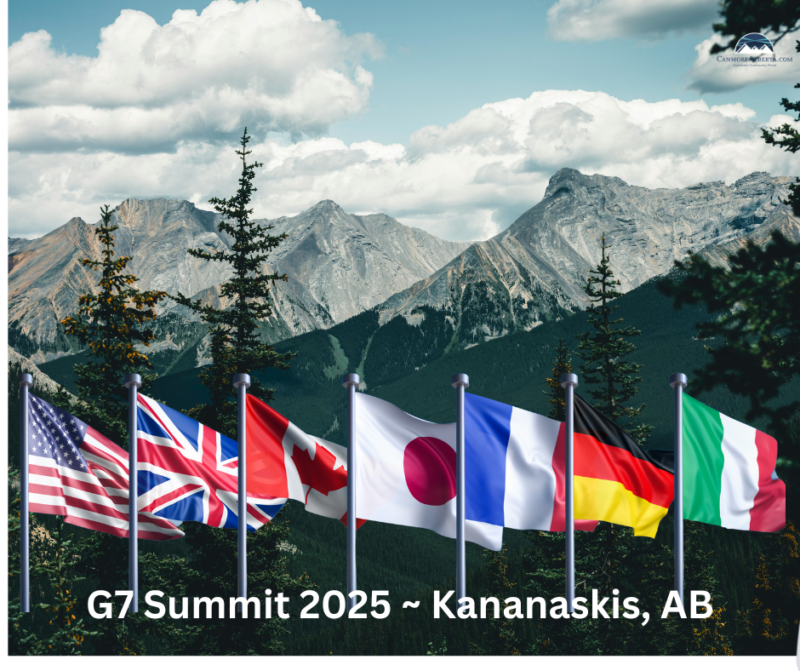Canada’s High-Stakes G7 Summit: Unity or Controversy? From June 15 to 17, 2025, Kananaskis, Alberta will serve as the global stage as Canada hosts the highly anticipated G7 Summit. The event marks Prime Minister Mark Carney’s first major international summit since assuming office and is seen as a defining moment in both Canada’s foreign and domestic policy direction.
In what some view as a bold diplomatic pivot, Carney has extended an invitation to Indian Prime Minister Narendra Modi as a special guest of the summit. The move aims to reset strained Canada-India relations but has drawn sharp criticism at home, particularly from Canada’s Sikh community and political opposition.
Canada’s G7 Agenda: Peace, Prosperity, and Partnership
Carney’s G7 agenda is anchored on three critical pillars:
- Global Peace & Security – Addressing challenges such as foreign interference, cyber threats, and regional conflicts.
- Sustainable Economic Growth – Promoting cooperation on clean energy, artificial intelligence, and critical minerals.
- Job Creation & Infrastructure – Enhancing global trade infrastructure and improving market access for Canadian businesses.
These themes resonate with Canada’s long-term ambitions to become a leader in the green economy and digital innovation space.
“This summit is not just a meeting of leaders, it’s a mission to rebuild global trust,” Carney said during a recent press conference.
The summit will include leaders from the United States, United Kingdom, Germany, France, Italy, Japan, and the European Union, positioning Canada at the center of key multilateral decisions.
Modi’s Invitation: Diplomatic Strategy or Political Gamble?
While Carney’s agenda has been largely praised, it is his decision to invite Narendra Modi that has dominated headlines. The invitation is widely viewed as a strategic move to normalize ties with India following years of tension, particularly under the previous Trudeau government.
Relations between the two nations deteriorated dramatically after Prime Minister Justin Trudeau publicly linked Indian intelligence operatives to the 2023 assassination of Sikh activist Hardeep Singh Nijjar in British Columbia. India denied any involvement and responded with sharp diplomatic actions, including suspending visas for Canadian nationals and downgrading diplomatic ties.
In inviting Modi, Carney appears to be taking a pragmatic approach.
“Engaging with India on a global stage like the G7 does not mean overlooking past concerns,” Carney emphasized. “It’s about shaping a more cooperative future.”
The goal appears to be twofold: restoring trade and diplomatic channels with one of the world’s largest economies while also demonstrating Canada’s global leadership through bridge-building.
Domestic Backlash: Sikh Groups and Opposition Voice Alarm
Not everyone is on board with this outreach. Several Sikh advocacy organizations in Canada have condemned the decision to welcome Modi, citing ongoing concerns over human rights violations, anti-Sikh sentiment in India, and lack of justice in Nijjar’s assassination.
The World Sikh Organization (WSO) issued a statement calling the invitation “a betrayal to Canadian Sikh families still seeking answers and accountability.”
“The invitation to Modi sends a dangerous message that Canada is willing to compromise its values for political convenience,” said Balpreet Singh, legal counsel for the WSO.
In addition, political opposition parties such as the New Democratic Party (NDP) and the Bloc Québécois have raised concerns about the lack of transparency in Carney’s decision-making process and the broader implications for Canada’s foreign policy credibility.
Strategic Implications: Why India Matters
Despite the domestic pushback, geopolitical analysts argue that India’s inclusion at the G7 reflects global economic and security realities. As a member of the BRICS bloc and one of the fastest-growing economies, India plays a crucial role in sectors directly relevant to Canada’s future—particularly clean technology, semiconductors, and critical minerals.
According to The Guardian, Carney’s invitation is about more than diplomacy—it’s about positioning Canada at the crossroads of East and West.
“You don’t build influence by isolating important nations,” said Professor Janice Stein of the University of Toronto. “You build it by talking—even when it’s difficult.”
This sentiment is echoed in other corners of the foreign policy community, where the Modi invitation is seen as a move toward “strategic realism.”
What’s at Stake?
The upcoming summit is not only a test of global cooperation but a referendum on Carney’s leadership style: strategic, measured, and unapologetically internationalist. While the success of the G7 will depend on outcomes related to trade, climate, and security, it’s the optics surrounding Modi’s participation that may shape public perception most.
For Canada, the summit presents both an opportunity and a challenge: to reconcile diversity at home with diplomacy abroad. As the world converges in Alberta, one thing is clear—this G7 Summit will be about more than just policy; it will be about principles, partnerships, and perception.
📚 Sources:
- The Guardian – Canada’s Modi Invitation Sparks Backlash
- Global News – Kananaskis to Host G7 in 2025
- World Sikh Organization – Official Statement
- Government of Canada – G7 2025 Overview

